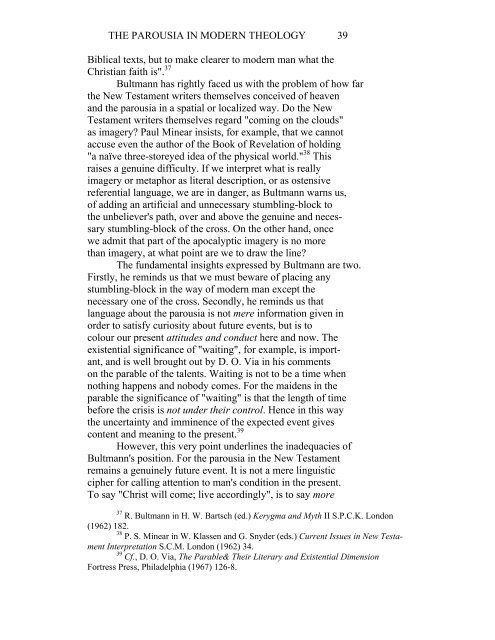the parousia in modern theology: some questions ... - Tyndale House
the parousia in modern theology: some questions ... - Tyndale House
the parousia in modern theology: some questions ... - Tyndale House
You also want an ePaper? Increase the reach of your titles
YUMPU automatically turns print PDFs into web optimized ePapers that Google loves.
THE PAROUSIA IN MODERN THEOLOGY 39<br />
Biblical texts, but to make clearer to <strong>modern</strong> man what <strong>the</strong><br />
Christian faith is". 37<br />
Bultmann has rightly faced us with <strong>the</strong> problem of how far<br />
<strong>the</strong> New Testament writers <strong>the</strong>mselves conceived of heaven<br />
and <strong>the</strong> <strong>parousia</strong> <strong>in</strong> a spatial or localized way. Do <strong>the</strong> New<br />
Testament writers <strong>the</strong>mselves regard "com<strong>in</strong>g on <strong>the</strong> clouds"<br />
as imagery? Paul M<strong>in</strong>ear <strong>in</strong>sists, for example, that we cannot<br />
accuse even <strong>the</strong> author of <strong>the</strong> Book of Revelation of hold<strong>in</strong>g<br />
"a naïve three-storeyed idea of <strong>the</strong> physical world." 38 This<br />
raises a genu<strong>in</strong>e difficulty. If we <strong>in</strong>terpret what is really<br />
imagery or metaphor as literal description, or as ostensive<br />
referential language, we are <strong>in</strong> danger, as Bultmann warns us,<br />
of add<strong>in</strong>g an artificial and unnecessary stumbl<strong>in</strong>g-block to<br />
<strong>the</strong> unbeliever's path, over and above <strong>the</strong> genu<strong>in</strong>e and neces-<br />
sary stumbl<strong>in</strong>g-block of <strong>the</strong> cross. On <strong>the</strong> o<strong>the</strong>r hand, once<br />
we admit that part of <strong>the</strong> apocalyptic imagery is no more<br />
than imagery, at what po<strong>in</strong>t are we to draw <strong>the</strong> l<strong>in</strong>e?<br />
The fundamental <strong>in</strong>sights expressed by Bultmann are two.<br />
Firstly, he rem<strong>in</strong>ds us that we must beware of plac<strong>in</strong>g any<br />
stumbl<strong>in</strong>g-block <strong>in</strong> <strong>the</strong> way of <strong>modern</strong> man except <strong>the</strong><br />
necessary one of <strong>the</strong> cross. Secondly, he rem<strong>in</strong>ds us that<br />
language about <strong>the</strong> <strong>parousia</strong> is not mere <strong>in</strong>formation given <strong>in</strong><br />
order to satisfy curiosity about future events, but is to<br />
colour our present attitudes and conduct here and now. The<br />
existential significance of "wait<strong>in</strong>g", for example, is import-<br />
ant, and is well brought out by D. O. Via <strong>in</strong> his comments<br />
on <strong>the</strong> parable of <strong>the</strong> talents. Wait<strong>in</strong>g is not to be a time when<br />
noth<strong>in</strong>g happens and nobody comes. For <strong>the</strong> maidens <strong>in</strong> <strong>the</strong><br />
parable <strong>the</strong> significance of "wait<strong>in</strong>g" is that <strong>the</strong> length of time<br />
before <strong>the</strong> crisis is not under <strong>the</strong>ir control. Hence <strong>in</strong> this way<br />
<strong>the</strong> uncerta<strong>in</strong>ty and imm<strong>in</strong>ence of <strong>the</strong> expected event gives<br />
content and mean<strong>in</strong>g to <strong>the</strong> present. 39<br />
However, this very po<strong>in</strong>t underl<strong>in</strong>es <strong>the</strong> <strong>in</strong>adequacies of<br />
Bultmann's position. For <strong>the</strong> <strong>parousia</strong> <strong>in</strong> <strong>the</strong> New Testament<br />
rema<strong>in</strong>s a genu<strong>in</strong>ely future event. It is not a mere l<strong>in</strong>guistic<br />
cipher for call<strong>in</strong>g attention to man's condition <strong>in</strong> <strong>the</strong> present.<br />
To say "Christ will come; live accord<strong>in</strong>gly", is to say more<br />
37<br />
R. Bultmann <strong>in</strong> H. W. Bartsch (ed.) Kerygma and Myth II S.P.C.K. London<br />
(1962) 182.<br />
38<br />
P. S. M<strong>in</strong>ear <strong>in</strong> W. Klassen and G. Snyder (eds.) Current Issues <strong>in</strong> New Testament<br />
Interpretation S.C.M. London (1962) 34.<br />
39<br />
Cf., D. O. Via, The Parable& Their Literary and Existential Dimension<br />
Fortress Press, Philadelphia (1967) 126-8.

















